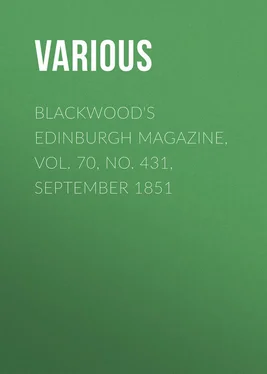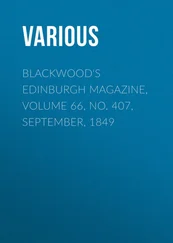Various - Blackwood's Edinburgh Magazine, Vol. 70, No. 431, September 1851
Здесь есть возможность читать онлайн «Various - Blackwood's Edinburgh Magazine, Vol. 70, No. 431, September 1851» — ознакомительный отрывок электронной книги совершенно бесплатно, а после прочтения отрывка купить полную версию. В некоторых случаях можно слушать аудио, скачать через торрент в формате fb2 и присутствует краткое содержание. Издательство: Иностранный паблик, Жанр: periodic, foreign_edu, Путешествия и география, на английском языке. Описание произведения, (предисловие) а так же отзывы посетителей доступны на портале библиотеки ЛибКат.
- Название:Blackwood's Edinburgh Magazine, Vol. 70, No. 431, September 1851
- Автор:
- Издательство:Иностранный паблик
- Жанр:
- Год:неизвестен
- ISBN:нет данных
- Рейтинг книги:3 / 5. Голосов: 1
-
Избранное:Добавить в избранное
- Отзывы:
-
Ваша оценка:
- 60
- 1
- 2
- 3
- 4
- 5
Blackwood's Edinburgh Magazine, Vol. 70, No. 431, September 1851: краткое содержание, описание и аннотация
Предлагаем к чтению аннотацию, описание, краткое содержание или предисловие (зависит от того, что написал сам автор книги «Blackwood's Edinburgh Magazine, Vol. 70, No. 431, September 1851»). Если вы не нашли необходимую информацию о книге — напишите в комментариях, мы постараемся отыскать её.
Blackwood's Edinburgh Magazine, Vol. 70, No. 431, September 1851 — читать онлайн ознакомительный отрывок
Ниже представлен текст книги, разбитый по страницам. Система сохранения места последней прочитанной страницы, позволяет с удобством читать онлайн бесплатно книгу «Blackwood's Edinburgh Magazine, Vol. 70, No. 431, September 1851», без необходимости каждый раз заново искать на чём Вы остановились. Поставьте закладку, и сможете в любой момент перейти на страницу, на которой закончили чтение.
Интервал:
Закладка:
The Hallengas, amongst whom the expedition now found itself, were far more frank and friendly, and much less wild, than the Haddendas and some other tribes, and they might probably have been converted into useful allies by a less cruel and capricious invader than the Bascha. But conciliation was no part of his scheme; if he one day caressed a tribe or a chief, it was only to betray them the next. Mr Werne was on good terms with some of the Hallenga sheiks, and went to visit the village of Hauathi, about three miles from camp, to see the birds of paradise which abounded there. On his road he saw from afar a great tree covered with those beautiful birds, and which glistened in the sunshine with all the colours of the rainbow. Some days later he and his brother went to drink merissa , a slightly intoxicating liquor, with one of the Fakis or priests of the country. The two Germans got very jovial, drinking to each other, student-fashion; and the faki, attempting to keep pace with them, got crying-drunk, and disclosed a well-matured plan for blowing up their powder-magazine. The ammunition had been stored in the village of Kadmin, which was a holy village, entirely inhabited by fakis. The Bascha had made sure that none of the natives would risk blowing up these holy men, even for the sake of destroying his ammunition, and he was unwilling to keep so large a quantity of powder amidst his numerous camp-fires and reckless soldiery. But the fakis had made their arrangements. On a certain night they were to depart, carrying away all their property into the great caverns of Mount Kassela, and fire was to be applied to the house that held the powder. Had the plot succeeded, the whole army was lost, isolated as it was in the midst of unfriendly tribes, embittered by its excesses, and by the aggressions and treachery of its chief, and who, stimulated by their priests, would in all probability have exterminated it to the last man, when it no longer had cartridges for its defence. The drunken faki's indiscretion saved Achmet and his troops; the village was forthwith surrounded, and the next day the ammunition was transferred to camp. Not to rouse the whole population against him, the Bascha abstained for the moment from punishing the conspirators, but he was not the man to let them escape altogether; and some time afterwards, Mr Werne, who had returned to Chartum, received a letter from his brother, informing him that nine fakis had been hung on palm-trees just outside the camp, and that the magnanimous Achmet proposed treating forty more in the same way.
A mighty liar was Effendina Achmet Bascha, as ever ensnared a foe or broke faith with a friend. Greedy and cruel was he also, as only a Turkish despot can be. One of his most active and unscrupulous agents was a bloodsucker named Hassan Effendi, whom he sent to the country of the Beni-Amers to collect three thousand five hundred cows and thirteen hundred camels, the complement of their tribute. Although this tribe had upon the whole behaved very peaceably, Hassan's first act was to shoot down a couple of hundred of them like wild beasts. Then he seized a large number of camels belonging to the Haddendas, although the tribe was at that very time in friendly negotiation with the Bascha. The Haddendas revenged themselves by burning Gos-Rajeb. In proof of their valour, Hassan's men cut off the ears of the murdered Beni-Amers, and took them to Achmet, who gave them money for the trophies. "They had forced a slave to cut off the ears; yonder now lies the man – raving mad, and bound with cords. Camel-thieves, too – no matter to what tribe they belong – if caught in flagranti , lose their ears, for which the Bascha gives a reward. That many a man who never dreamed of committing a theft loses his ears in this way, is easy to understand, for the operation is performed on the spot." Dawson Borrer, in his Campaign in the Kabylie , mentions a very similar practice as prevailing in Marshal Bugeaud's camp, where ten francs was the fixed price for the head of a horse-stealer, it being left to the soldiers who severed the heads and received the money to discriminate between horse-stealers and honest men. Whether Bugeaud took a hint from the Bascha, or the Bascha was an admiring imitator of Bugeaud, remains a matter of doubt. "Besides many handsome women and children, Hassan Effendi brought in two thousand nine hundred cows, and seven thousand sheep." He might have been a French prince returning from a razzia. "For himself he kept eighty camels, which he said he had bought ." A droll dog, this Hassan Effendi, but withal rather covetous – given to sell his soldier's rations, and to starve his servants, a single piastre – about twopence halfpenny – being his whole daily outlay for meat for his entire household, who lived for the most part upon durra and water. If his servants asked for wages, they received the bastinado. "The Bascha had given the poor camel-drivers sixteen cows. The vampire (Hassan) took upon himself to appropriate thirteen of them." Mr Werne reported this robbery to the Bascha, but Achmet merely replied " malluch " – signifying, "it matters not." When inferior officers received horses as their share of booty, Hassan bought them of them, but always forgot to pay, and the poor subalterns feared to complain to the Bascha, who favoured the rogue, and recommended him to the authorities at Cairo for promotion to the rank of Bey, because, as he told Mr Werne with an ironical smile, Hassan was getting very old and infirm, and when he died the Divan would bring charges against him, and inherit his wealth. Thus are things managed in Egypt. No wonder that, where such injustice and rascality prevail, many are found to rejoice at the prospect of a change of rulers. "News from Souakim (on the Red Sea) of the probable landing of the English, excite great interest in camp; from all sides they come to ask questions of us, thinking that we, as Franks, must know the intentions of the invaders. Upon the whole, they would not be displeased at such a change of government, particularly when we tell them of the good pay and treatment customary amongst the English; and that with them no officer has to endure indignities from his superiors in rank."
"I have now," says Mr Werne, (page 256,) "been more than half a year away from Chartum, continually in the field, and not once have I enjoyed the great comfort of reposing, undressed, between clean white sheets, but have invariably slept in my clothes, on the ground, or on the short but practical angarèb. All clean linen disappears, for the constant perspiration and chalky dust burns everything; and the servants do not understand washing, inasmuch as, contrasted with their black hides, everything appears white to them, and for the last three months no soap has been obtainable. And in the midst of this dirty existence, which drags itself along like a slow fever, suddenly 'Julla!' is the word, and one hangs for four or five days, eighty or a hundred leagues, upon the camel's back, every bone bruised by the rough motion, – the broiling sun, thirst, hunger, and cold, for constant companions. Man can endure much: I have gone through far more than I ever thought I could, – vomiting and in a raging fever on the back of a dromedary, under a midday sun, more dead than alive, held upon my saddle by others, and yet I recovered. To have remained behind would have been to encounter certain death from the enemy, or from wild beasts. We have seen what a man can bear, under the pressure of necessity; in my present uniform and monotonous life I compare myself to the camels tied before my tent, which sometimes stand up, sometimes slowly stretch themselves on the ground, careless whether crows or ravens walk over their backs, constantly moving their jaws, looking up at the sun, and then, by way of a change, taking a mouthful of grass, but giving no signs of joy or curiosity."
Читать дальшеИнтервал:
Закладка:
Похожие книги на «Blackwood's Edinburgh Magazine, Vol. 70, No. 431, September 1851»
Представляем Вашему вниманию похожие книги на «Blackwood's Edinburgh Magazine, Vol. 70, No. 431, September 1851» списком для выбора. Мы отобрали схожую по названию и смыслу литературу в надежде предоставить читателям больше вариантов отыскать новые, интересные, ещё непрочитанные произведения.
Обсуждение, отзывы о книге «Blackwood's Edinburgh Magazine, Vol. 70, No. 431, September 1851» и просто собственные мнения читателей. Оставьте ваши комментарии, напишите, что Вы думаете о произведении, его смысле или главных героях. Укажите что конкретно понравилось, а что нет, и почему Вы так считаете.












